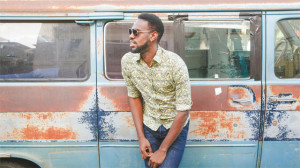“It was all about this child who felt completely alone, and something about it reminded me of ‘Sometimes I Feel Like a Motherless child,’ which was the only Negro spiritual I knew,” Russell recalls. “I started combining them line for line, and eventually it started to cohere, not just as a piece of music but as an expression very much in the same emotional vein, as much Jewish as it was black. Coming from a similar time, the 19th century, it didn’t seem strange to me. It felt instinctual.”
It’s easy to overstate the parallels between the Ashkenazi Jewish experience in pre-Holocaust Europe and the African-American experience in chattel slavery and under Jim Crow. But the Hebrew Bible’s story of exile, slavery and the long struggle for freedom resonated powerfully with African-Americans, just as Black musical expression inspired so many Jewish musicians and composers in America and Europe.
While Russell spent a good deal of time searching for songs that could amplify each other’s theme, he was often successful in combining Yiddish songs and spirituals “so they’re seamless,” he says. “The odd thing is that they really work together. I don’t do anything to make them. The melodies shadow each other. The idea is to take these pieces and illustrate a world in which these things are happening all at once.”

Developing this unusual repertoire was one thing. Performing it in front of Jewish audiences was another matter entirely. Worried he would come across as needlessly provocative, he hesitated before accepting an engagement at Toronto’s 2012 Ashkenaz Festival, the largest Jewish music showcase in North America. Audiences loved his music, but wanted to get a fix on just who was this black guy singing Yiddish songs with so much soul.
“When I started singing in Yiddish I had no patter,” Russell says. “I was like, now I’m going to sing a song about a man who’s exiled to Siberia. I hope you like it. That first big gig at the Ashkenaz Festival was a free concert, and it was standing room only and I was already a little freaked out. I hadn’t worked with Jewish audiences very long, and I’m doing these non-introductions and people start raising their hands. Where do you come from? You’re singing in Yiddish, how does that happen? It didn’t occur to me that people have a lot of questions. You need to be explained. You are anomalous.”
Russell came by his Jewish identity not via a spiritual epiphany but through love. Growing up in a devout but not doctrinal Christian household, he always felt drawn to the Hebrew Bible, or as Christians call it, the Old Testament. He grew up mostly in Vallejo, and studied voice at Oakland’s Holy Names University, and had minimal contact with Jewish people until his 20s. Heading to New York City in 2007 for his first major role in an opera production, Mozart’s Così fan tutte, he was looking at an online gay dating site and found a guy in New York he thought was cute. They ended up making a date to meet at a Mets game, and hit it off. Russell moved to New York to pursue the relationship and his career in opera, and he’s been with Rabbi Mike Rothbaum ever since. They relocated to the Bay Area in the summer of 2012 when Rothbaum was hired as rabbi and educator at Danville’s Congregation Beth Chaim.
“We got very serious, and he asked me at some point, are you at all interested in converting?” Russell says. “It felt very much a part of myself, how I viewed the world. It was a no-brainer for me, and not a hard thing to do.”
These days Russell drops Yiddish into casual conversations like he grew up in Brooklyn with grandparents from the shtetl. He’s found a tight-knit community of artists similarly devoted to Old World Jewish music, which is what led to his collaboration with Veretski Pass. He first met the trio, which features bassist Stuart Brotman and the Berkeley-based couple, fiddler Cookie Segelstein and Joshua Horowitz on tsimbl (hammered dulcimer) and button accordion, at the fateful 2012 Ashkenaz Festival.
They’ve become close musical confidantes — Russell stars in Veretski Pass’s bawdy one act production Lilith, The Night Demon, which premieres May 1 at the Osher Marin JCC’s Kanbar Center, May 3 at the JCC East Bay, and May 4 at the Menlo-Atherton Performing Arts Center. For Russell, the Bay Area music scene has offered an ideal setting in which to craft a musical identity as an African-American Jew.
“In Northern California it feels like the sky’s the limit,” he says. “I met some great people in New York who were supportive of what I was doing with Yiddish music, but in New York you’re in a constant state of evaluation. People are trying to figure out if you’re wasting their time. If you’re a black man who decides one day you’re going to sing in Yiddish, it was very hard to find anyone excited about it and what I was doing.”



